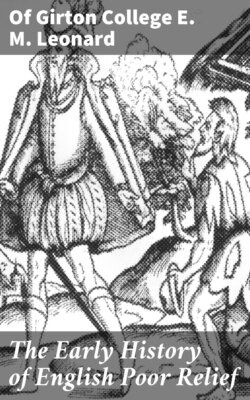Читать книгу The Early History of English Poor Relief - of Girton College E. M. Leonard - Страница 9
На сайте Литреса книга снята с продажи.
Оглавление10. Survey of poor and regular assessment of parishioners in Cambridge.
At Cambridge also similar measures were taken. Some of the profits arising from Stourbridge fair had been left to the poor of Cambridge and was connected with a provision for the maintenance of "obiits." The funds belonging to the poor were preserved to them by the statute of chantries, but before 1552 it had not been paid. Complaint was then made, and it was decreed that the sum should be paid to the mayor, bailiffs, and burgesses, and should be distributed by them as in ancient times: this order was confirmed by royal grant in 1557[91]."
It is possible that the passing of this money through their hands may have made the town authorities regard the care of the poor as especially their duty.
In any case, in 1556, there was great scarcity and, on Dec. 7th, "Dr. Perne, Vice-chancellor, Doctors Segewycke, Harvy, Walker and Blythe met the Mayor, Bailiffs and two Aldermen in St. Mary's Church[92]." They called before them the churchwardens of all the parisshes, and these "browght in the bylls what any parryshoner was cessed towardes the relyeffe of the poore." Two days later the churchwardens presented "bylles of the number of poore people in the parisshes," and they were told to make a report as to "three states of the poore sort" and to inquire who had come into the parish within three years. Later, four superintendents and four "watchers for straunge beggeres" were appointed, and collectors were chosen for the next Sunday. The Vice-chancellor moved the Heads of Houses to make provision for the poor, and the superintendents went about the different parishes and visited the poor and settled what each should receive. On December 24th the Mayor and Vice-chancellor met at St. Mary's to again settle what each poor person should be given and to give greater sums to some of them than had been before appointed[93].
In 1560 a set of ordinances was made for the purpose of raising funds to pay these pensions. Dues were to be paid for admission into the liberties of the town, for beginning actions in the Cambridge Law Courts, for the admission of attorneys to plead, for the surrendering of every booth and the signing of every lease. All these were to augment the funds for the poor. The attorneys were also to pay 1d. for every fee[94].
Thus in Cambridge also we have, first, the surveying and numbering of the poor; then, regular contributions from the parishioners, and regular payments to the poor who could not support themselves. At Cambridge there was no town hospital before 1569, and it was not until 1578 that a proposal to establish one there was made.
But attempts were already being made to found municipal hospitals in Norwich and Gloucester, and these we shall examine when we consider the events of the period between 1569 and 1597. Moreover, three of the old hospitals of York were refounded and placed under municipal management[95]. There the poor could be "set on worke" and the income derived from them was to be "ymployed to the maintenance of the powre." At Leicester also a municipal system for the poor had developed, and it seems that, in 1568, two collections were levied for this purpose, one of which provided the funds necessary for the relief distributed under the authority of the statutes, and the other met the expenditure incurred under the municipal regulations[96].
Thus in Lincoln, Ipswich, Cambridge, and York the order of development in matters concerning beggars and the unemployed is similar to that of London. Beggars are surveyed; the truly helpless are licensed; the others are forbidden to ask for any relief. Compulsory rates for their relief were levied in Ipswich and probably in Cambridge. At the same time provision is made for finding the able-bodied work in Lincoln, and hospitals are built or refounded for them in Ipswich, in York, and in Gloucester.
In Ipswich as in London all this was done before 1569, but other towns were much more backward, and in some the beggars were still unrestrained. There was thus no national system of poor relief, but only isolated municipal attempts to deal with the matter, all following the same general lines and becoming the rule, and not the exception, as time went on. It will be more convenient to consider the advantages of this system when we have also examined the doings of Parliament and Privy Council, and can consider the organisation before 1569 as a whole. The municipal system alone was not successful, in London or elsewhere; it was increasingly difficult to deal with new-comers and to provide funds.
But already before 1569 there were the beginnings of the succeeding national system in the doings of Parliament and Privy Council.
